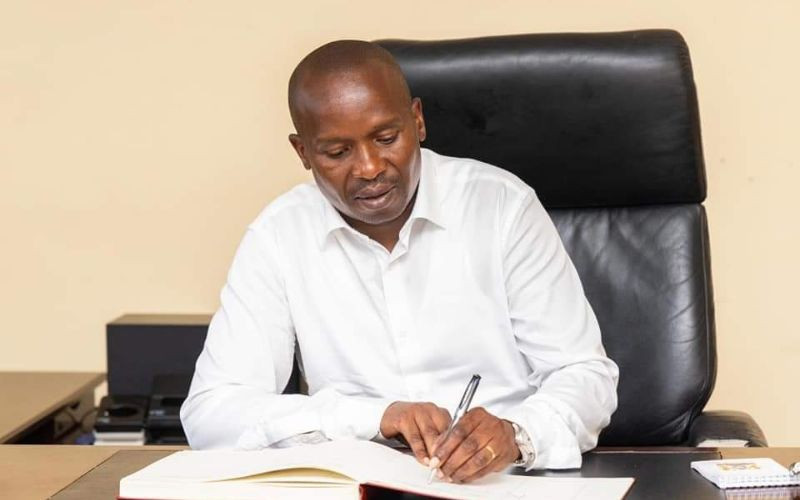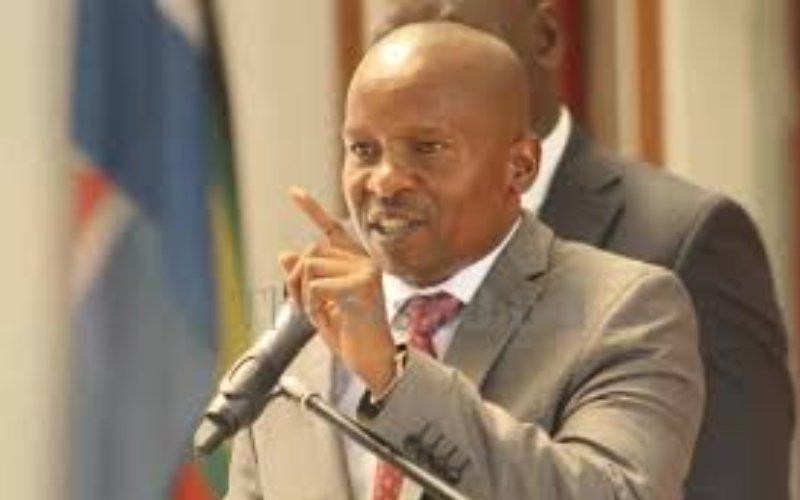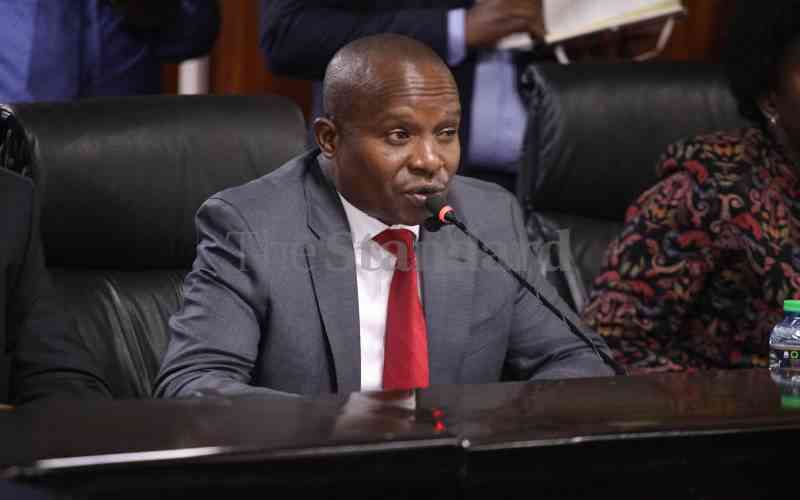NAIROBI, KENYA: Tharaka Nithi Senator Kithure Kindiki and his Bungoma counterpart Moses Wetang’ula may be serving unconstitutionally as majority and minority leaders respectively, The Standard on Sunday has established.
This is because the Constitution is silent on the positions of majority and minority leaders in the Senate.
And this is not a product of personal manoeuvre by the two, but rather a technical flaw in establishment and operations of the Senate, as designed by the Constitution. The apparent oversight is a most guarded secret among legislators.
That the matter at hand is delicate and sensitive is demonstrated by the fact that Kindiki, around who the latest revelation revolves, refused to be drawn into the discussion. Phone calls to Wetang’ula also went unanswered.
SUPERIOR HOUSE
“It is true these positions are not spelt out in the Constitution, as is the case for those in the National Assembly, which are clearly captured in Article 108. But why do you want to bring out this fact now?” a Senator, who did not wish to be named, asked this writer.
The Senator attributes this flaw to mischief by drafters of the Constitution and a ring of powerful politicians in the Tenth Parliament “who were all along opposed to devolution and a bicameral parliamentary system”.
According to Article 108, sub-article (2) of the Constitution, “the leader of the majority party shall be the person who is the leader in the National Assembly of the largest party or coalition of parties”, while sub-article (3) states that the leader of the minority party “shall be the person who is the leader in the National Assembly of the second largest party or coalition of parties”.
Article 108, which deals with positions of party leaders, is however silent on similar titles in the Senate. This realisation has indeed taken many by surprise. Samburu West MP, Lati Lelit, argues that the development is a clear indicator of which House the Constitution recognises as “senior and operational”.
LEGAL OVERSIGHT
“By appointing Kindiki and Wetang’ula to these positions, the Senate has acted unconstitutionally. As taxpayers, this may well be the time for Kenyans to ask why their money has been used to pay salaries and allowances to holders of non-existent positions,” digs in the MP. The latest development begs a host of questions. Was this a deliberate move to demean the Senate and sabotage its operations? If so, who are the forces behind the plot?
And just how was the Senate expected to execute its mandate without the key offices of Leader of Majority and Leader of Minority? Or was it simply a legal oversight on the part of the drafters – the Committee of Experts (CoE)?
Otiende Amollo, who served as one of the members of the Nzamba Kitonga-led committee, confesses culpability, only to the “small extent” of not spelling out a method of identifying party leaders in the Senate.
“Unlike in the National Assembly in Article 108, (2) and (3) where we clarified the criteria of identifying a Leader of Majority and Leader of Minority, we did not repeat the same detail for the Senate. But that is a pretty small matter because it follows that what happens in the National Assembly must apply to the Senate,” argues Amollo.
The constitutional lawyer, who now serves as head of the Commission on Administrative Justice, explains that any doubts about the existence of the said Senate positions are addressed already in Article 93 (1), which establishes the Parliament of Kenya that’s consists of the two Houses. “Article 108, sub-article (1), further states that there shall be a leader of the majority party and a leader of the minority party. This applies to both the National Assembly and Senate as envisaged under Article 93 (1) of the Constitution,” says Amollo.
Stay informed. Subscribe to our newsletter
And although Law Society of Kenya (LSK) Chairman Eric Mutua points out that there is a loophole in the law with regard to Kindiki and Wetang’ula’s positions, he maintains the situation is manageable. “I do not think there is a big problem here. The fact that there is a lacuna does not stop the Senate from carrying out its mandate. It is the parliamentary practice, the world over, for both houses to have leaders of majority and minority,” Mutua told The Standard on Sunday.
On recognising the legal anomaly in the Constitution, Speaker of the Senate Ekwe Ethuro said members were compelled to quickly address the problem: “The same Constitution provides for Standing Orders in Parliament and gives Parliament legislative powers to make new laws.”
Orange Democratic Movement (ODM) Nominated Senator Janet Ong’era, who is deputy Minority Whip, explains that members legislated on the creation of the positions in question, among others, under the Standing Orders, to facilitate parliamentary business.
GOOD FAITH
But Lelit claims the Senate is engaging in an illegality: “The law must be obeyed. If the Constitution recognises those positions, it should have stated so. But judging from its consistence – where the National Assembly has the wider mandate and where its Speaker serves as boss over the two Houses – our colleagues in the Senate are breaking the law.”
Lelit is only among the few vocal MPs who openly voice their disregard for the Senate. On overall, though, his colleagues in the National Assembly have exhibited hostility towards their Senate counterparts, with Igembe South MP Mithika Linturi condescendingly referring to it as “Nyumba ya Wazee”.
Dismissing claims of the Senate engaging in an illegality, Ethuro regrets that some MPs have made it their business to constantly direct attacks at the Senate. The Speaker quotes Article 259, saying the Constitution expects everybody to act in good faith in interpreting it “and to apply it holistically in letter and the spirit”.
Nonetheless, Ong’era said the Senate is in the process of identifying and putting together a host of legislations for enactment to promote devolution and streamline Senate’s operations, including having the positions of Leaders of Majority and Minority captured in the Constitution. Ethuro sums it thus: “We simply want to rectify what was doubtlessly an oversight. Parliament consists of two Houses – National Assembly and the Senate – and what is good for the gander is good for the goose”.
 The Standard Group Plc is a
multi-media organization with investments in media platforms spanning newspaper
print operations, television, radio broadcasting, digital and online services. The
Standard Group is recognized as a leading multi-media house in Kenya with a key
influence in matters of national and international interest.
The Standard Group Plc is a
multi-media organization with investments in media platforms spanning newspaper
print operations, television, radio broadcasting, digital and online services. The
Standard Group is recognized as a leading multi-media house in Kenya with a key
influence in matters of national and international interest.
 The Standard Group Plc is a
multi-media organization with investments in media platforms spanning newspaper
print operations, television, radio broadcasting, digital and online services. The
Standard Group is recognized as a leading multi-media house in Kenya with a key
influence in matters of national and international interest.
The Standard Group Plc is a
multi-media organization with investments in media platforms spanning newspaper
print operations, television, radio broadcasting, digital and online services. The
Standard Group is recognized as a leading multi-media house in Kenya with a key
influence in matters of national and international interest.









